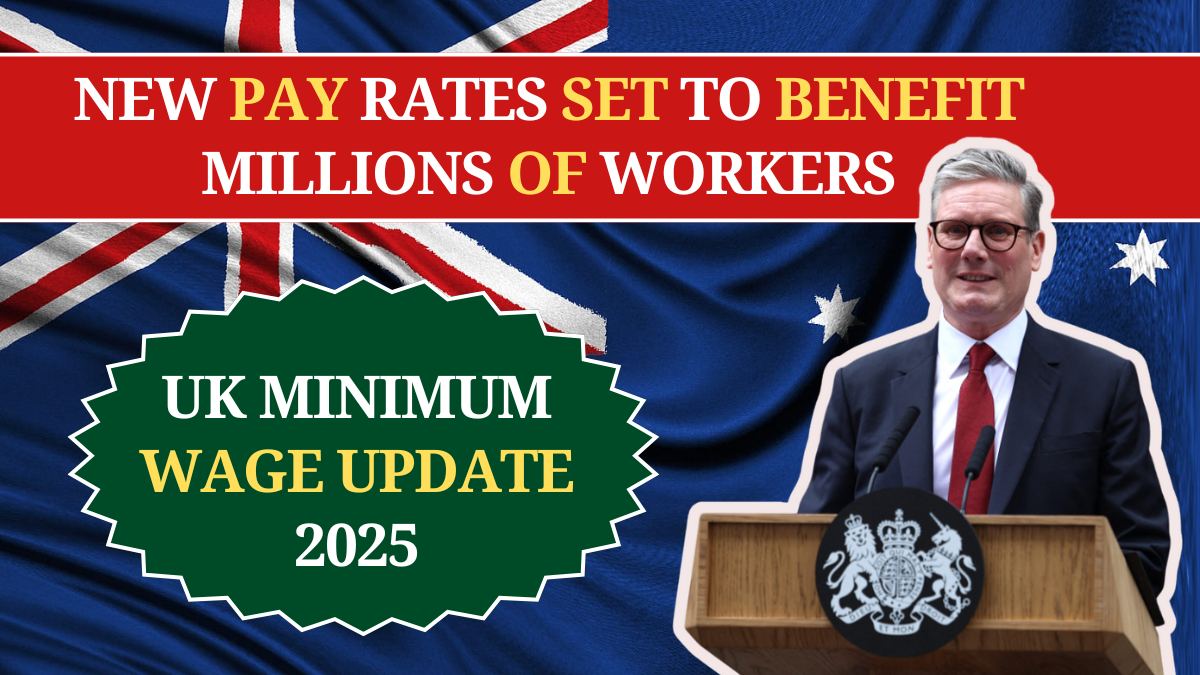The increasing life costs, the British government has also promoted the national minimum wage to be in force in April 2025. The move will affect millions of workers in service sectors such as nationwide, especially young adults, families and employees with low incomes.
This change shows the government’s determination to address equal compensation and income inequality for this inflation and financial stress.
What are the new minimum wage rates in 2025?
The following increase has been confirmed by the government for the national minimum wage and national lifetime to be paid since April 1, 2025:

- National Living Salary (21 and above): £ 11.44 per hour
- Age 18–20: £ 8.60 per hour
- Age 16-17: £ 6.50 per hour
- Trainee interest: £ 5.28 per hour
Previously, national living wages were only reserved for employees who are 23 years and above. From 2025, the eligibility is reduced to 21, so the more tip of the workforce will be covered by pay level.
Why Is the Minimum Wage Rising?
The increase in wage rates requires a great extent to live and high inflation costs, which has put pressure on the financing of British houses. The government’s purpose is to ensure that the work continues to be paid properly, especially for poor income, and retain the families even when it comes to paying everyday costs such as housing, food, transport and fuel bills.
In addition, the action also responds to the recommendations of the Cum Pay Commission, which is a public body that is not a participant working on wage cases with the government. The new prices are designed for the direction of financial results and employment.
How Many People Will Be Affected?
Evaluations state that more than 2.7 million workers in the UK will be directly affected by the rise in wages. These include:
- Youth entering the labor market
- Temporary and part-time employees
- Employees in over-demand but low-wage industries such as care, hospitality, retail, and agriculture
- First-year apprentices and trainees
Most employers will be required to rethink payroll arrangements and budgeting in order to keep up with the new rates.
Impact on Employers
Whereas the employees will benefit from increased earnings, the developments entail additional burdens for employers. Organizations will be required to:

- Achieve compliance with the new wage legislation
- Modify payroll systems and employment contracts
- Absorb higher labor costs, which can impact price or workforce composition in certain industries.
The government continues to advise small and medium-sized businesses as to how to best prepare for changes in wages without harming their bottom line.
Regional and Sectoral Factors
Despite the National Minimum Wage applying equally across England, Scotland, Wales, and Northern Ireland, the effect is regionalized:
- For London and large cities, where the costs of living are more expensive, the rise will seem modest.
- In rural or poorer areas, the new rates mean a great advancement for working-class families.
Sectors with traditionally lower pay such as hospitality, cleaning, agriculture, and social care will have the most marked changes in payroll habits and workforce planning.
Apprenticeship and Youth Employment Boost
Apprentices also have their wages increase to £5.28 an hour if they are below 19 or in the first year of the apprenticeship. After a year or if 19 or older, they are eligible for the relevant minimum wage depending on their age.
This change is part of a broader strategy to encourage skills development, support vocational training, and increase youth employment. The wage increase will help make apprenticeships more financially viable for young adults.
How to Check If You’re Being Paid Correctly
All employers are legally required to pay at least the minimum wage to their workers. Employees who suspect underpayment can:
- Contact HMRC through their confidential helpline.
- File a complaint online at gov.uk.
- Take advice from ACAS (Advisory, Conciliation and Arbitration Service).
It’s also recommended that employees check their pay slips and contracts to make sure they comply with pay laws.
The Broader Economic Context
This rise is part of the UK government’s commitment to increase the National Living Wage to two-thirds of median earnings. In this way, the UK gets closer to a “high-wage, high-skill” economy.
Yet critics caution that although the increase benefits most workers, it must be part of an overall strategy involving
Tax relief to low-income families
- Better access to childcare
- Rent controls or housing subsidies
- Long-term measures to reduce the cost of living
Read More:- Top 10 LinkedIn Profile Tips for College Students Starting Their Careers
Lacking those, wage increases will be neutralized by ongoing inflation and pressures on the housing market.
Conclusion
The 2025 UK minimum wage revision is a historic shift that demonstrates the government’s attempt to create a more equitable and fairer labor market. With wages increased for millions and the reduction of the National Living Wage age limit to 21, this step presents actual financial benefit to employees throughout the UK.
Whether you are an employee who wants to check your rights again or your employer is ready to make changes to your payroll, it’s a moment of being aware of and working. As wage policy develops, the anxiety is still to create a more flexible, inclusive and balanced economy – where the experiment meets decent remuneration.
FAQs:-
What is the new UK minimum wage rate for 2025?
The new minimum wage is expected to rise to £11.44 per hour for workers aged 21 and over, starting April 2025.
What is the new wage rate for 18–20-year-olds?
Workers aged 18–20 are expected to receive £8.60 per hour, a significant increase from the 2024 rate.
Why is the UK government raising the minimum wage?
To combat inflation, support cost of living, and promote fair pay for lower-income workers.

Shreya Singh is a dedicated professor and lecturer with a strong academic background in pharmaceuticals and education. She completed her D. Pharma from Chandigarh University and holds a B.Ed. from Delhi University. With years of teaching experience at the college level, Shreya brings deep subject knowledge and a passion for learning to every classroom and blog post. An avid writer and educator, she enjoys sharing insightful content, simplifying complex topics, and helping students and readers grow academically and professionally.

1 thought on “UK Minimum Wage Update 2025, New Pay Rates Set to Benefit Millions of Workers”